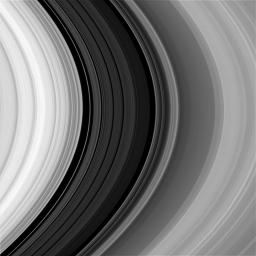Study in Scarlet
Caption:
If your eyes could only see the color red, this is how Saturn's rings would look.
Many Cassini color images, like this one, are taken in red light so scientists can study the often subtle color variations of Saturn's rings. These variations may reveal clues about the chemical composition and physical nature of the rings. For example, the longer a surface is exposed to the harsh environment in space, the redder it becomes. Putting together many clues derived from such images, scientists are coming to a deeper understanding of the rings without ever actually visiting a single ring particle.
This view looks toward the sunlit side of the rings from about 11 degrees above the ringplane. The image was taken in red light with the Cassini spacecraft narrow-angle camera on Dec. 6, 2014.
The view was acquired at a distance of approximately 870,000 miles (1.4 million kilometers) from Saturn and at a Sun-Saturn-spacecraft, or phase, angle of 27 degrees. Image scale is 5 miles (8 kilometers) per pixel.
Background Info:
The Cassini-Huygens mission is a cooperative project of NASA, the European Space Agency and the Italian Space Agency. NASA's Jet Propulsion Laboratory, a division of the California Institute of Technology in Pasadena, manages the mission for NASA's Science Mission Directorate, Washington. The Cassini orbiter and its two onboard cameras were designed, developed and assembled at JPL. The imaging operations center is based at the Space Science Institute in Boulder, Colo.
For more information about the Cassini-Huygens mission visit
http://saturn.jpl.nasa.gov
and
http://www.nasa.gov/cassini
. The Cassini imaging team homepage is at
http://ciclops.org
.
Cataloging Keywords:
| Name |
Value |
Additional Values |
| Target |
Saturn Rings |
Saturn |
| System |
Saturn |
|
| Target Type |
Ring |
Planet |
| Mission |
Cassini-Huygens |
|
| Instrument Host |
Cassini Orbiter |
|
| Host Type |
Orbiter |
|
| Instrument |
Imaging Science Subsystem (ISS) |
|
| Detector |
Narrow Angle Camera |
|
| Extra Keywords |
Grayscale, Visual |
| Acquisition Date |
|
| Release Date |
2015-02-09 |
| Date in Caption |
2014-12-06 |
|
| Image Credit |
NASA/JPL-Caltech/Space Science Institute |
| Source |
photojournal.jpl.nasa.gov/catalog/PIA18301 |
| Identifier |
PIA18301 |

 Planetary Data System
Planetary Data System
